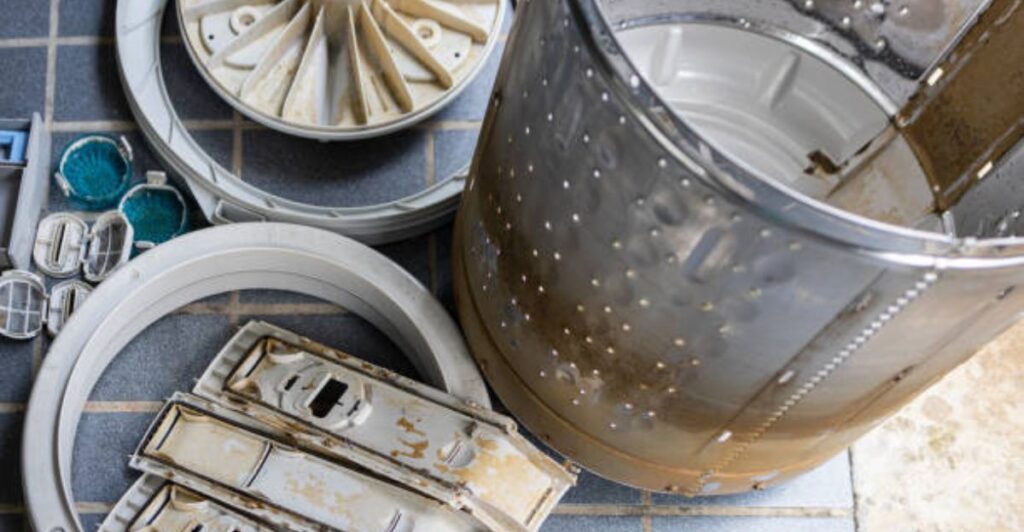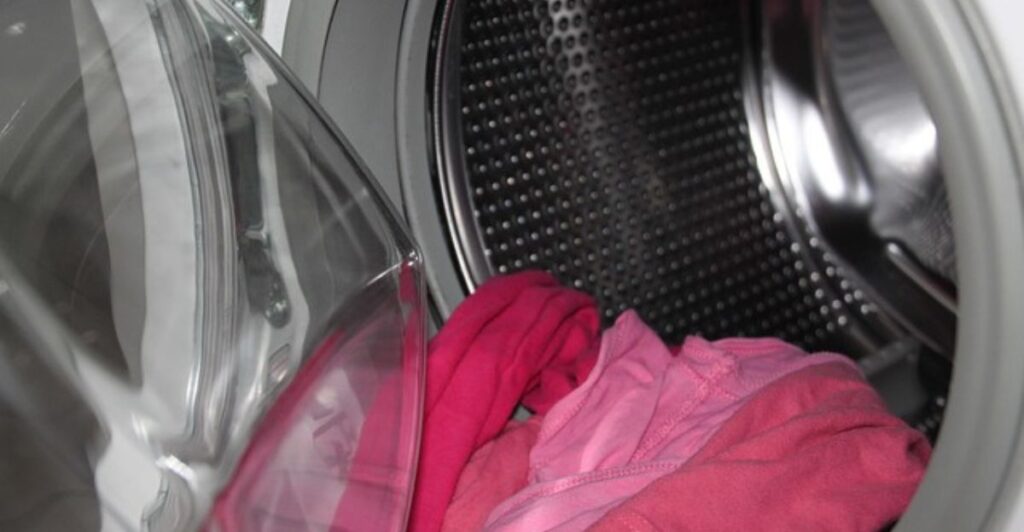Introduction
6 Natural Solutions to Prevent Musty Smell in Washing Machines During Monsoon
Rainy season brings cool breezes and cozy days, but it also comes with high humidity that makes washing machines prone to musty odors. Dampness inside the drum, detergent buildup, and poor ventilation create the perfect environment for mold and mildew. Luckily, there are natural solutions that can keep your washing machine fresh without relying on harsh chemicals.
🌧️ Why Washing Machines Smell Musty During Monsoon
6 Natural Solutions to Prevent Musty Smell in Washing Machines

The monsoon season brings high humidity and dampness, creating the perfect environment for mold and mildew to thrive inside washing machines. If left unchecked, this can lead to unpleasant odors, bacterial buildup, and even damage to your appliance.
🌿 1. Use White Vinegar for Deep Cleaning
Why it works: White vinegar is a natural disinfectant that breaks down mineral deposits and kills odor-causing bacteria.
How to use:
- Add 2 cups of white vinegar to the drum.
- Run a hot water cycle without any clothes.
- Repeat once a month during monsoon.
🍋 2. Add Baking Soda for Odor Neutralization
Why it works: Baking soda absorbs moisture and neutralizes acidic odors.
How to use:
- Mix ¼ cup of baking soda with water.
- Pour into the detergent drawer and run a short cycle.
- Leave the door open afterward to air out.
🌬️ 3. Keep the Door and Detergent Drawer Open
Why it works: Air circulation prevents moisture buildup and mold growth.
Actionable Tip: After every wash, leave the door and detergent drawer open for at least 30 minutes.
🧼 4. Wipe Down Seals with Tea Tree Oil Solution
Why it works: Tea tree oil has antifungal and antibacterial properties.
How to use:
- Mix 10 drops of tea tree oil with 1 cup of water.
- Use a cloth to wipe the rubber seals and drum.
- Repeat weekly during monsoon.
🌾 5. Use Desiccants or Silica Gel Packs
Why it works: Desiccants absorb excess moisture, reducing the chance of mold.
How to use:
- Place silica gel packs near or inside the machine when not in use.
- Replace them every few weeks.
🧺 6. Wash with Neem Leaves or Neem Oil
Why it works: Neem is a powerful natural antibacterial and antifungal agent.
How to use:
- Add a handful of neem leaves or 1 tablespoon of neem oil to the drum.
- Run a rinse cycle to cleanse and deodorize.
✅ Bonus Tips for Monsoon Washing Machine Care
Even with natural solutions, consistent habits make all the difference. Here are some extra tips to keep your washing machine fresh and functional during the damp season:
🧽 Clean the Lint Filter Weekly
Moist lint can become a breeding ground for bacteria. Remove and rinse the filter once a week to prevent buildup and odors. Keyword: clean washing machine filter
🌬️ Improve Airflow Around the Machine
Avoid placing your washing machine in a cramped or poorly ventilated area. Use a small fan or dehumidifier nearby if needed. Keyword: washing machine ventilation tips
🧴 Use Low-Sudsing Detergents
Excess suds leave behind residue that traps moisture and causes smells. Opt for HE (High Efficiency) or low-sudsing detergents. Keyword: best detergent for washing machine smell
🧼 Dry the Rubber Gasket After Every Wash
The rubber seal around the door traps water and grime. Wipe it dry with a clean cloth after each use. Keyword: prevent mold in washing machine gasket
📅 Schedule a Monthly Deep Clean
Set a reminder to run a vinegar or baking soda cycle every 30 days. Regular maintenance keeps your machine odor-free. Keyword: monthly washing machine cleaning routine
🌟 Benefits of Keeping Washing Machines Fresh
Maintaining a clean and odor-free washing machine isn’t just about pleasant-smelling laundry—it’s a smart habit that pays off in multiple ways. Here’s why regular freshness matters:

🧺 1. Fresher, Cleaner Laundry
A musty machine transfers odors and bacteria to clothes. Keeping it clean ensures your garments come out truly fresh, not just perfumed by detergent
🛡️ 2. Prevents Mold and Mildew Growth
Moisture and detergent residue create a breeding ground for mold. Regular cleaning stops fungal buildup before it starts.
⚙️ 3. Extends Appliance Lifespan
A well-maintained machine runs more efficiently and lasts longer. You’ll avoid costly repairs and premature replacements.
💧 4. Improves Water Drainage and Efficiency
Clogged filters and residue can slow drainage and reduce spin performance. A fresh machine uses less water and energy.
🧼 5. Reduces Skin Irritation and Allergies
Leftover detergent and mold spores can trigger skin issues. A clean drum means safer clothes for sensitive skin.
💰 6. Saves Money on Repairs and Rewashes
Foul smells often signal deeper issues. Preventive care helps you avoid technician visits and the need to rewash smelly loads.
🔮 Trending Laundry Habits in 2025
Laundry is no longer just a chore—it’s a reflection of eco-conscious living, tech-savvy choices, and personalized care. Here’s what’s shaping the way people wash in 2025:

🌱 1. Detergent Sheets Go Mainstream
Why it’s trending: Compact, plastic-free, and pre-measured, detergent sheets are replacing bulky jugs and powders.
- Biodegradable and TSA-friendly
- Ideal for cold-water washing
- Popular among minimalists and eco-conscious consumers
❄️ 2. Cold-Water Washing Becomes the Default
Why it’s trending: Rising energy costs and climate awareness are driving cold-water habits.
- Enzymatic boosters for stain removal
- Cold-activated cleaning agents
- Energy-efficient machines with cold rinse cycles
🧴 3. Skin-Safe, Hypoallergenic Formulas
Why it’s trending: Consumers are prioritizing skin health, especially for babies and sensitive skin.
- Fragrance-free and dermatologist-tested
- Plant-based surfactants
- Allergen-free certifications
📦 4. Minimalist & Compostable Packaging
Why it’s trending: Laundry packaging is going green and smart.
- Kraft boxes and refillable pouches
- QR-coded smart labels for reordering
- Subscription refill packs with compostable mailers
🧠 5. Smart Washing Machines with AI Sensors
Why it’s trending: Appliances now detect fabric type, soil level, and optimize cycles automatically.
- AI-powered wash settings
- App-controlled scheduling
- Water and energy usage tracking
🧺 6. Multi-Functional Laundry Spaces
Why it’s trending: Laundry rooms are evolving into hybrid zones—doubling as pantries or mudrooms.
- Stylish, space-saving designs
- Integrated storage and drying rails
- Popular in urban and modular homes
🧼 7. Natural Additives Like Vinegar & Neem
Why it’s trending: People are turning to natural remedies for freshness and hygiene.
- Vinegar for odor control
- Neem oil for antibacterial care
- Baking soda for stain lifting
✅ Suggestions for Best Results
To make the most of these natural solutions and keep your washing machine fresh all monsoon long, follow these expert-backed habits:
📅 1. Be Consistent with Cleaning
Don’t wait for odors to appear. Schedule a monthly deep clean using vinegar or baking soda to stay ahead of buildup.
🚪 2. Keep It Open
After every wash, leave the door and detergent drawer open for at least 30 minutes. This simple habit prevents moisture from settling.
🧼 3. Wipe Down After Use
Use a soft cloth to dry the rubber gasket and drum after each cycle. This prevents mold from forming in hidden crevices.
🌿 4. Rotate Natural Additives
Alternate between tea tree oil, neem, and vinegar to keep bacteria guessing and your machine balanced.
🧴 5. Use the Right Detergent
Choose low-sudsing, eco-friendly detergents that rinse clean and don’t leave residue behind.
🧊 6. Avoid Overloading
Overstuffing traps moisture and reduces airflow. Leave space for clothes to tumble freely and dry properly.
🧠 Pro Tip: Turn Routine into Ritual
Treat these habits as part of your self-care mindset. A clean machine leads to clean clothes—and a clearer mind. Small actions, repeated consistently, create big results.
Conclusion
Keeping your washing machine odor-free during the rainy season doesn’t require harsh chemicals. By using natural solutions like baking soda, vinegar, lemon, and essential oils, you can prevent musty smells while ensuring a healthier home. Combine these remedies with good ventilation and regular maintenance, and your washing machine will stay fresh all monsoon long.
References
* American Cleaning Institute – Tips for Laundry Appliance Care
* Environmental Protection Agency (EPA) – *Indoor Air Quality & Mold Prevention
* Healthline – Natural Cleaning Alternatives for a Healthier Home
FAQs
Q1. Why does my washing machine smell during monsoon?
High humidity causes moisture buildup, leading to mold, mildew, and musty odors.
Q2. Can I use vinegar regularly in my washing machine?
Yes, vinegar is safe when used once a month for cleaning. Avoid excessive use as it may affect rubber parts over time.
Q3. How often should I deep-clean my washing machine in rainy season?
At least once every 3–4 weeks to prevent odor buildup.
Q4. Do essential oils really help with odors?
Yes, oils like tea tree and eucalyptus have natural antibacterial and antifungal properties.

